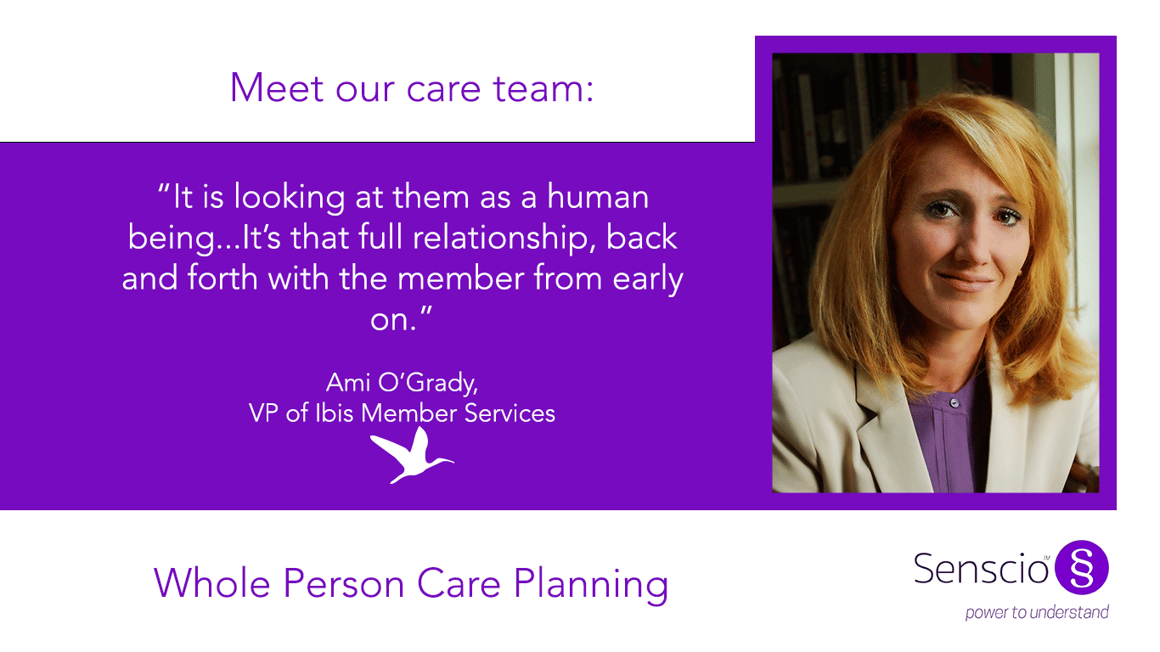Whole Person Care Planning: A Discussion with Ami O'Grady, VP of Member Services

Living well looks different for each individual, but everyone needs good food, sleep, exercise, mindfulness and a sense of connection to thrive. Recent medical studies show that by addressing all our health needs — including social, emotional and community needs — we can feel our best with chronic conditions and avoid unnecessary hospitalizations.
But taking that whole person approach can often seem an insurmountable task in a health care system where physicians continue to be in short supply and the average time spent with a patient during an office visit is a mere 13-16 minutes.

Ami O’Grady has spent more than two decades as a registered nurse working in health care, leading teams of providers across a variety of settings, from inpatient rehab hospitals to home health companies. Nearly all that time she has cared for older patients, including those with multiple chronic conditions, many of whom require more frequent check-ins, better coordination and a greater level of ongoing care.
She’s seen firsthand how the system is broken.
“I just never felt like there was enough time or ability to really provide that individualized support to patients. I couldn’t help my team to meet their own goals of what they wanted to do,” O’Grady said. “It became a very frustrating space to work in.”
Ibis Health offers a different approach, O’Grady said, utilizing technology to fill gaps in care for thousands of Medicare-eligible adults so they can flourish between visits to their doctor.
Ibis Health, an innovative chronic care management program from Senscio Systems, combines AI-powered round-the-clock virtual monitoring with clinical team support to empower its members to live well on their terms. Ibis Health members receive a continuously connected tablet known as the IbisHub that helps to track weight, medications, diet, exercise and other health indicators, flagging risk for decline before it happens. Member advocates work one-on-one to customize the program, providing friendly encouragement and coaching.
As Vice President of Ibis Health Services, O’Grady leads the Ibis Health care team and oversees efforts to deliver whole health support to the program’s members. This begins with getting to know new members, finding out what matters most, and then partnering with them to develop personalized care plans that prioritize their health concerns and goals.
What is whole person care planning, and how is the Ibis Health approach different from what one might find in other health care settings?“Care planning is a pretty generic term that can mean a lot of things to a lot of people in the health care world. As a nurse, no matter what setting you work in, there has to be a care plan of some kind. That’s fine and great, you can create care plans, you can put them into place, but they are usually cookie cutter, and you are just doing it for compliance sake. …They may also be limited to a specific condition. Going to a PCP, while they are focused on your health and wellness, they are more often approaching problems and fixing them. Same for a specialist — a cardiologist is really just focusing on your heart. Senscio’s approach to the whole person encompasses everything about them: Who is in their life to support them? The whole person, their mental health, their physical health, how they get around, do they have transportation? It’s knowing the whole picture of their health and what goes into their lives.” |
|
To learn more about Senscio Systems and its innovative Ibis Health Program visit www.sensciosystems.com and www.ibishealth.org.
Want to receive more insightful articles like this? Sign-up for our free monthly e-newsletter:






